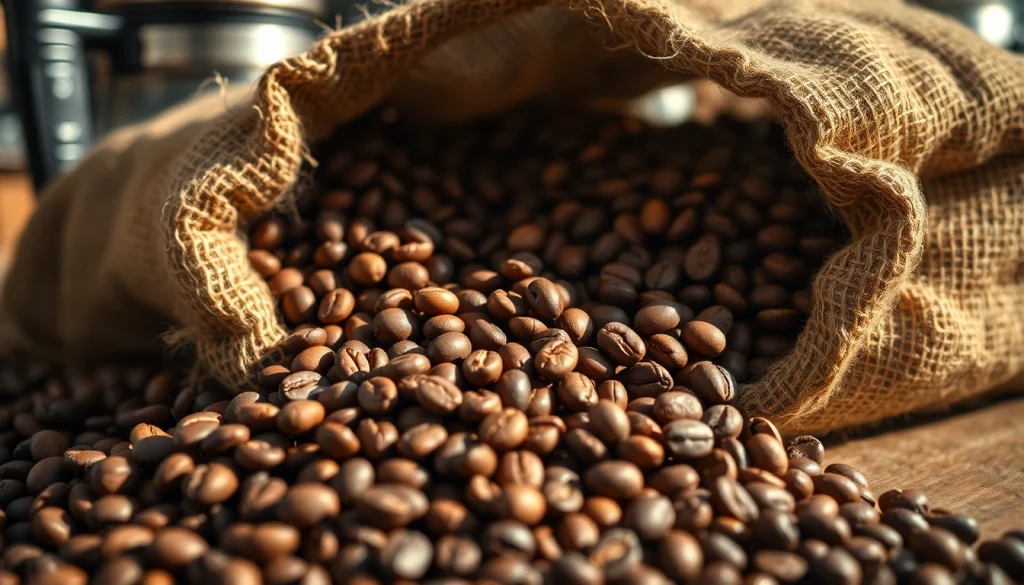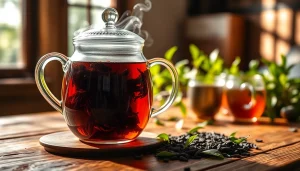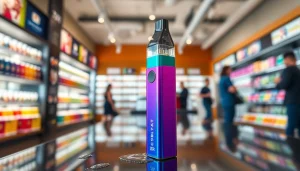Discover the Art of Brewing with Premium Decaf Coffee Beans

Understanding Decaf Coffee Beans
What Are Decaf Coffee Beans?
Decaf coffee beans are coffee beans from which most of the caffeine has been removed. The decaffeination process typically involves water, organic solvents, or a carbon dioxide method to extract caffeine while preserving the flavor compounds that give coffee its distinctive taste. While decaf does not have the stimulating effects of regular coffee, it offers the rich flavor profile that coffee lovers enjoy, allowing them to indulge without the negative side effects of caffeine.
How Decaffeination Affects Flavor
Decaffeination can influence the flavor of coffee beans in various ways. The method used for decaffeination plays a significant role in this regard. For instance, beans treated with solvents may retain more of their original flavor, while those subjected to steaming or water-based processes might lose some aromatic oils and flavors due to the high temperatures involved. It’s essential to choose high-quality decaf coffee beans, as they can significantly impact your overall coffee experience. Taste testing different decaf varieties can help you find a flavor profile that suits your palate.
Common Varieties of Decaf Coffee Beans
There are several popular varieties of decaf coffee beans, including Arabica and Robusta, each bringing unique characteristics. Arabica beans are known for their sweet, soft taste and higher acidity, while Robusta beans tend to have a stronger, harsher flavor profile and contain more caffeine than their Arabica counterparts. Other popular decaf coffee options include Single Origin coffees, which are sourced from a specific locale, and blends that combine beans from different regions to create a balanced flavor. Choosing a variety that reflects personal taste preferences can enhance the enjoyment of decaf coffee.
The Health Benefits of Decaf Coffee Beans
Decaf Coffee Beans vs. Regular Coffee
The primary difference between decaf coffee and regular coffee is caffeine content. Decaf coffee typically retains about 1-2% of the original caffeine present in the beans, which is significantly less than a regular cup of coffee that can contain 95 mg or more per 8-ounce serving. For those sensitive to caffeine, opting for decaf can lead to fewer side effects like jitters, anxiety, and sleep disturbances, making it a suitable choice for evening consumption or for caffeine-sensitive individuals.
Antioxidant Properties of Decaf Coffee
Decaf coffee beans are rich in antioxidants, which are compounds that help fight oxidative stress and inflammation in the body. These antioxidants, including chlorogenic acid, are present in both decaf and regular coffee but are often more concentrated in decaf due to the decaffeination process. Consuming decaf coffee may aid in preventing certain diseases, such as diabetes, cardiovascular issues, and even some cancers, thanks to the protective properties of these antioxidants.
How Decaf Coffee Fits into a Healthy Lifestyle
Integrating decaf coffee into your daily routine can have numerous health benefits. For individuals looking to reduce caffeine intake, decaf offers a way to enjoy the ritual and social aspects of coffee without the accompanying jitters or crashes. Additionally, the balanced blend of antioxidants helps promote overall health. Furthermore, studies suggest that drinking decaf coffee may contribute to a lower risk of liver disease and enhance metabolic health.
Brewing Techniques for Decaf Coffee Beans
Best Brewing Methods for Decaf Coffee
Decaf coffee can be brewed using various techniques, each yielding different flavors and intensities. The most popular brewing methods for decaf coffee include:
- Pour-Over: This method allows for precise control over the water temperature and brew time, enhancing the flavor extraction of decaf coffee.
- French Press: This method is ideal for full-bodied decaf coffee, as the coffee grounds steep directly in hot water, providing a rich taste.
- Espresso: High-pressure extraction makes espresso a great way to enjoy decaf coffee if you love its intense flavor.
Recommended Brew Ratios and Temperatures
To achieve the best flavor from decaf coffee, a proper brew ratio of coffee to water is crucial. A general recommendation is to use 1-2 tablespoons of coffee per 6 ounces of water. The ideal brewing temperature typically ranges from 195°F to 205°F (90°C to 96°C). However, adjusting these ratios and temperatures based on personal preference is recommended to achieve the desired flavor profile from the decaf beans.
Enhancing Flavors with Additives
Enhancing the flavor of decaf coffee can be achieved through various additives. Natural sweeteners like honey, flavored syrups, or even spices like cinnamon and nutmeg can elevate the drinking experience, catering to diverse palates. Additionally, milks, creamers, or plant-based alternatives can add creaminess and flavor depth to your decaf brew. Experimenting with these options can lead to a delightful and customizable coffee experience.
Choosing Quality Decaf Coffee Beans
What to Look For When Buying Decaf Coffee
When purchasing decaf coffee beans, several factors indicate quality. Look for fresh, whole beans rather than pre-ground decaf, as this offers better flavor retention. Consider the roast level—light, medium, or dark—and choose one based on your taste preference. Certifications like Fair Trade or Organic can also signal ethical sourcing and potentially higher quality. Additionally, seek out brands with detailed flavor descriptions for a better understanding of what each coffee will taste like.
Understanding the Labels and Certifications
Deciphering coffee labels can be daunting, but understanding key certifications can guide quality choices. Organic certifications indicate that no harmful pesticides or chemicals were used in cultivation. Fair Trade certifications ensure that the growers receive fair payment for their labor. Other labels, such as Rainforest Alliance, focus on sustainable practices. Familiarizing yourself with these labels enhances the ability to choose high-quality decaf coffee beans responsibly.
Top Brands and Roasters for Decaf Coffee Beans
There is a broad array of brands and roasters offering exceptional decaf coffee beans. Some top options include:
- Peet’s Coffee: Known for their rich flavor profiles and sustainable sourcing.
- Stumptown Coffee Roasters: Offers a well-curated selection of decaf options with unique tasting notes.
- Verve Coffee Roasters: Offers high-quality heirloom varietals decaffeinated under meticulous standards.
These brands are known for quality and customer satisfaction, making them a safe bet for delicious decaf coffee.
Storing and Maintaining Decaf Coffee Beans
Optimal Storage Conditions
To maintain freshness and flavor, it’s essential to store decaf coffee beans correctly. Beans should be kept in an airtight container away from light, heat, and moisture. A cool, dark pantry works ideally for storage. Avoid keeping beans in the refrigerator or freezer, as temperature fluctuations can cause condensation and negatively affect flavor.
How to Extend Freshness
To extend the freshness of your decaf coffee beans, consider purchasing them in smaller quantities, ensuring that you use them within a couple of weeks. If you buy larger amounts, divide them into smaller bags and seal them tightly. Additionally, grinding only the amount needed for each brew will help preserve the bean’s freshness and essential oils, leading to a better cup of coffee.
Signs Your Decaf Coffee Beans Have Gone Stale
Recognizing the signs of stale decaf coffee beans can help you avoid a disappointing cup. Some indicators include:
- Loss of Aroma: Fresh coffee beans should emit a strong, pleasant aroma. If the beans smell flat or stale, they are likely past their prime.
- Change in Color: High-quality coffee beans exhibit a rich, consistent color. Beans that appear dull or have uneven coloring may be stale.
- Off Taste: If your brew lacks depth or has an unpleasant aftertaste, the beans may have degraded in quality.
By keeping an eye out for these signs and following proper storage practices, you can ensure the best decaf coffee experience.







